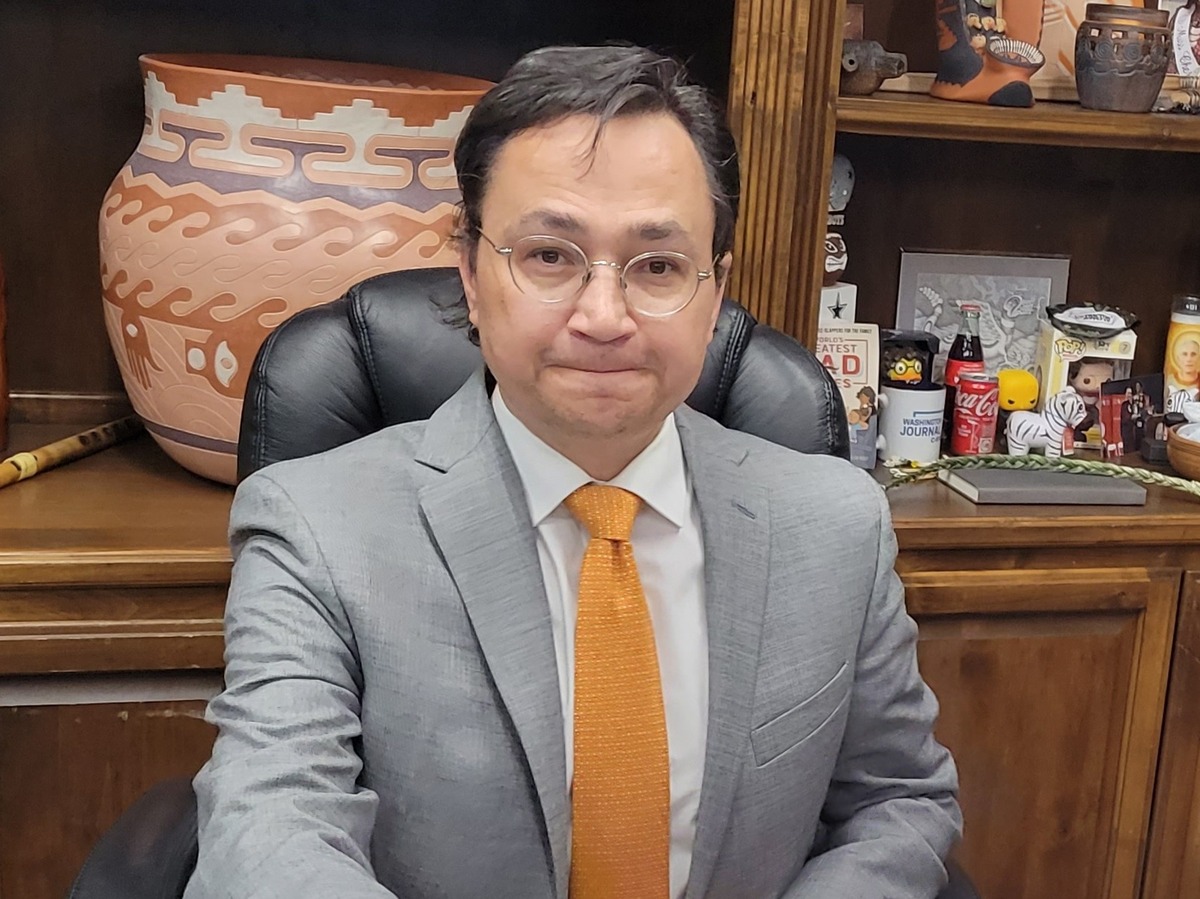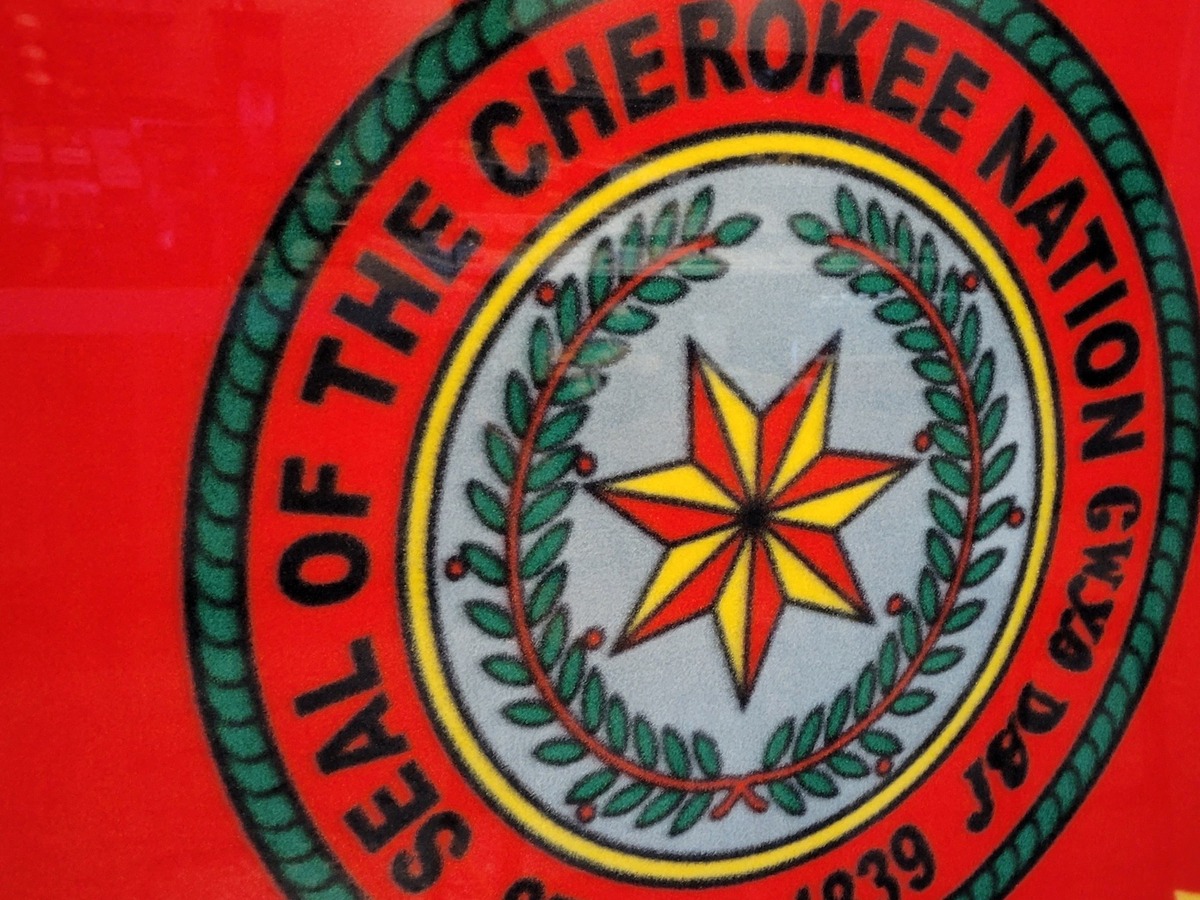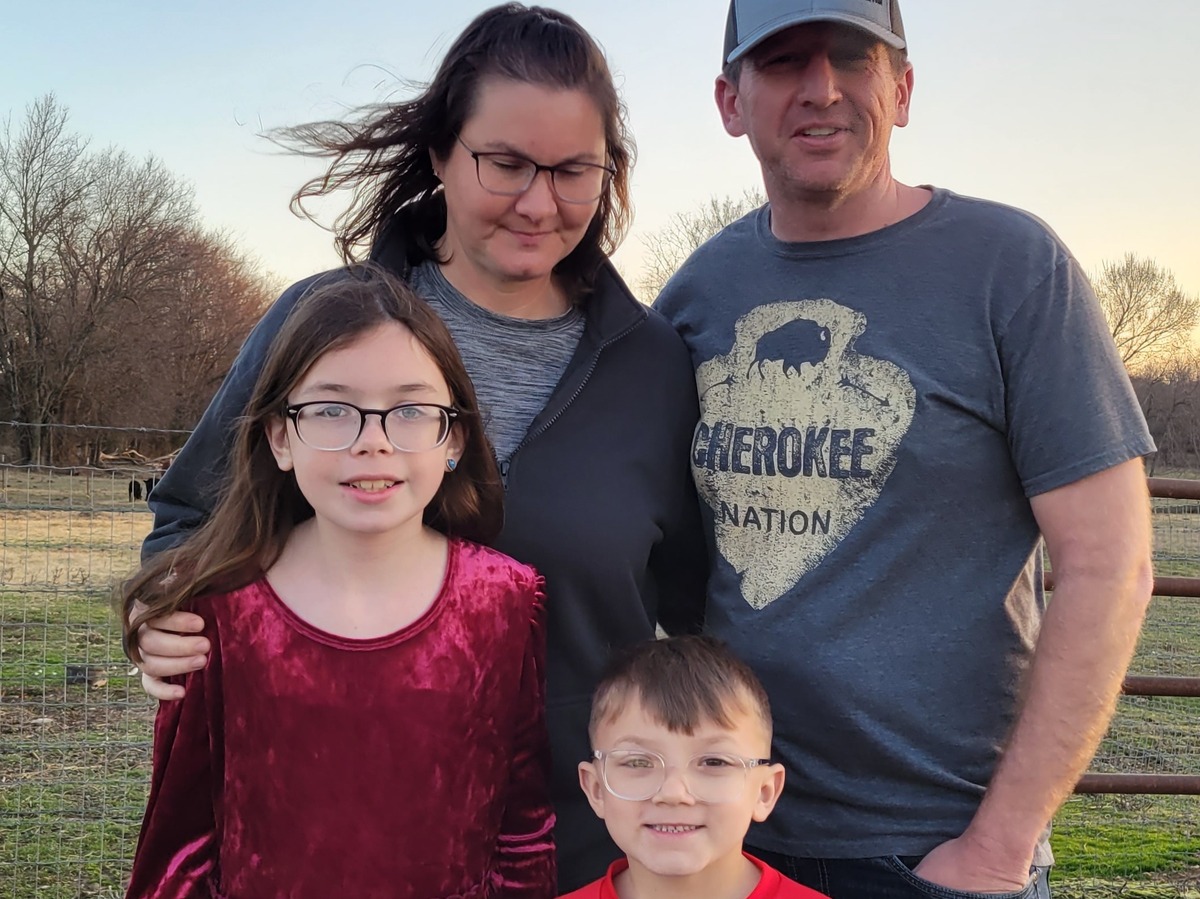[ad_1]

Mazzy, age 9, and Ransom, age 6, had been adopted by Gary and Cassie Walker after their organic dad and mom acquired caught up within the opioid epidemic. The Walkers have adopted or fostered 9 Cherokee children in the course of the drug disaster.
Brian Mann/NPR
disguise caption
toggle caption
Brian Mann/NPR

Mazzy, age 9, and Ransom, age 6, had been adopted by Gary and Cassie Walker after their organic dad and mom acquired caught up within the opioid epidemic. The Walkers have adopted or fostered 9 Cherokee children in the course of the drug disaster.
Brian Mann/NPR
Late one afternoon, Mazzy Walker provides a tour of her household’s farm close to Tahlequah, Okla., capital of the Cherokee Nation.
“Cows are strolling, turkeys, a canine,” she mentioned, laughing at her position as tour-guide. “I do not know what!”
Mazzy is 9 years outdated. Strolling by way of the grass, she wears a flowing purple gown, big eyeglasses and large boots. She’s interested in every part.
“So I heard you reside in New York?” she mentioned to a reporter who had come to go to.
“Inform him why you wish to go there, Mazzy,” mentioned Gary Walker, her dad. She grins and solutions, “As a result of there’s an American Lady doll retailer.” Seems Mazzy loves American Lady dolls.
Mazzy and her 6-year-old brother, Ransom, are each Cherokee, as is Gary. The youngsters are additionally each adopted. Their organic dad and mom acquired caught up within the opioid disaster that has hit the reservation with devastating drive.
“All the kids we have adopted or fostered have been due to that,” mentioned Cassie Walker, Gary’s spouse. To date, they’ve taken in 9 Cherokee children.
Requested about her first household, her organic mother and pa, Mazzy shrugs and laughs nervously, a few of her boldness slipping away.
“I do not know, I by no means acquired to fulfill them,” she mentioned.
An epidemic of overdoses and damaged households
This is part of the opioid-fentanyl disaster that does not get talked about a lot. Fentanyl is now a number one explanation for demise for Individuals beneath the age of 40.
Even when folks survive, habit is breaking apart households, as much more dad and mom lose custody of their children.
The Cherokee nation’s Principal Chief Chuck Hoskin says the drug disaster right here is so intense, it threatens efforts to strengthen his folks’s lifestyle.
“That is such an vital mission for the Cherokee nation, [restoring] our language and tradition, and but this drug drawback is actually hampering it.”

Principal Chief Chuck Hoskin heads the Cherokee Nation, which has about 450,000 members. A 3rd of these residents dwell on the reservation round Tahlequah, Okla., the place opioid habit has hit arduous.
Brian Mann/NPR
disguise caption
toggle caption
Brian Mann/NPR

Principal Chief Chuck Hoskin heads the Cherokee Nation, which has about 450,000 members. A 3rd of these residents dwell on the reservation round Tahlequah, Okla., the place opioid habit has hit arduous.
Brian Mann/NPR
Based on Hoskin, so many Cherokee households are being disrupted that kids wind up being fostered or adopted exterior the tribal tradition.
“Households not solely being damaged up, however kids being faraway from tribal lands, that is an extra stress,” he mentioned. “Something we will do to maintain households entire means we will hold our youngsters.”
Artificial opioids threaten communities together with the Cherokee Nation in Oklahoma
Here is how the Cherokee Nation is spending opioid settlement cash
Gary Walker skilled this wave of habit and despair up shut, as he and Cassie labored with the foster care system.
“Going to court docket, I’d generally sit there for 4 or 5 – 6 hours,” he remembers. “I’d watch 30 or 40 instances on the similar time. It actually hit me then simply how large the issue was.”
All the youngsters the Walkers have taken in, together with Mazzy and Ransom, had been uncovered to medication within the womb.
“A few of them had been undoubtedly opioid,” Gary mentioned. “One in all them, it was 14 totally different medication. I did not even know 14 totally different medication existed on the time. It is actually heartbreaking.”
That is meant well being and developmental challenges for Mazzy and Ransom. As we speak, Mazzy listens intently and chimes in with a query for her dad and mom.
“How outdated was I after I like realized to love speak and stuff?” she requested.
“You had been nearer to three,” mentioned Cassie, who notes she has struggled at instances to elucidate to the youngsters how this drug disaster reshaped their lives.
“We all the time remind them that God gave them to us very particular. Their dad and mom had been sick so we had been capable of elevate them. There are moms on the market that did lose their baby, and I used to be capable of develop into their mom. So there may be simply a whole lot of feelings.”
Weak Native American communities struggle again

Tahlequah, Okla., is the capital of the Cherokee Nation. Information launched as a part of opioid lawsuits present Native American cities like Tahlequah had been swamped with prescription opioids beginning within the late Nineteen Nineties.
Brian Mann/NPR
disguise caption
toggle caption
Brian Mann/NPR

Tahlequah, Okla., is the capital of the Cherokee Nation. Information launched as a part of opioid lawsuits present Native American cities like Tahlequah had been swamped with prescription opioids beginning within the late Nineteen Nineties.
Brian Mann/NPR
Public well being specialists say it is not stunning Native American households have been so susceptible to opioid habit and different types of habit.
Throughout the U.S., many tribes just like the Cherokee confronted generational trauma, together with genocide and compelled relocation. Later, authorities boarding faculties tore aside households and financial discrimination drove tribes into grinding poverty.
“This has wrought devastation on our conventional methods of life at key junctures in historical past,” mentioned Joseph Gone, a member of the Aaniiih-Gros Ventre tribal nation and a public well being researcher at Harvard College. “One factor we have seen world wide is when somebody’s society collapses is a flip to substances of abuse.”
Starting within the late Nineteen Nineties, drug corporations started flooding many Native American cities with prescription ache tablets.
A lot of the general public consciousness throughout America’s opioid disaster has targeted on rural white cities. However Gone says Native communities suffered even increased charges of opioid habit, overdose demise and suicide.
“Deaths of despair had been truly worse amongst American Indians and Alaska Natives for an extended time frame,” he mentioned.
A research Gone co-authored in The Lancet, a number one medical journal, discovered deaths amongst middle-age Native Individuals rose at thrice the speed of white Individuals from 1999-2013, the interval when prescription opioid gross sales boomed within the U.S.
New research and drug distribution knowledge launched as a part of opioid lawsuits present Native American cities like Tahlequah had been swamped with prescription opioids.
“I am fully satisfied that the [drug] trade bears accountability due to the variety of tablets that had been dumped on the reservation,” mentioned Principal Chief Hoskin.
“That is not an accident. That is as a result of there was revenue to be gained.”
One prescription, 10 years misplaced
Lots of the households round Tahlequah inform tales of how prescription tablets wrecked their lives and broken their kids.
Brenda Barnett, a Cherokee citizen, was pregnant together with her son, Ryan, within the Nineteen Nineties when the reservation was first flooded with opioids.
She says her household had already been scarred by her brother’s habit to ache tablets and heroin.
“At the moment, I used to be pondering, ‘I am unable to undergo what my Mama went by way of. I am unable to do it.’ I used to be terrified,” she recalled “That was one of many greatest fears I had in elevating a toddler, and it occurred.”

Brenda Barnett and her son, Ryan, members of the Cherokee Nation, say opioids almost destroyed their household after Ryan turned hooked on ache tablets, heroin and fentanyl. However they’re looking forward to his restoration and the tribe’s future.
Brian Mann/NPR
disguise caption
toggle caption
Brian Mann/NPR

Brenda Barnett and her son, Ryan, members of the Cherokee Nation, say opioids almost destroyed their household after Ryan turned hooked on ache tablets, heroin and fentanyl. However they’re looking forward to his restoration and the tribe’s future.
Brian Mann/NPR
Ryan was 15 when he harm his hand in a automobile door. A health care provider prescribed Oxycontin.
Based on Ryan, that first opioid prescription, that first excessive, derailed his life. “I used to be like, that is nice. I will do no matter I acquired to do to really feel this fashion eternally,” he mentioned.
Ryan, who’s 31 years outdated now, says he hates serious about what adopted. He misplaced 10 years to tablets, heroin and fentanyl — and in addition misplaced lots of his Cherokee buddies to medication.
“, I did take a giant chunk of my life and throw it within the trash,” he mentioned. “You lose your finest buddies on this entire factor. In the event that they’re alive, they’re in jail for probably the most half.”
The Cherokee sued Huge Pharma, successful $100 million

Tribal leaders within the Cherokee Nation say $100 million received from Huge Pharma in opioid settlements will assist their group heal from many years of habit.
Brian Mann/NPR
disguise caption
toggle caption
Brian Mann/NPR

Tribal leaders within the Cherokee Nation say $100 million received from Huge Pharma in opioid settlements will assist their group heal from many years of habit.
Brian Mann/NPR
Over the previous decade, 1000’s of governments across the U.S., together with tribal governments, sued the drug trade for its alleged position fueling the opioid disaster.
In the long run, most corporations concerned within the opioid commerce, together with title model corporations equivalent to Johnson & Johnson and Walmart, agreed to nationwide settlements, money payouts value greater than $50 billion.
Principal Chief Hoskin says his tribe’s share of that cash, roughly $100 million {dollars}, has revolutionized habit take care of the Cherokee.
“The struggling would have continued, our lack of ability to immediately present care would have been very restricted. And now that is fully modified,” he mentioned.
At a ceremony final month, Cherokee leaders unveiled the primary main undertaking, an in-patient habit restoration heart deliberate for Tahlequah.

Principal Chief Chuck Hoskin (left) and Deputy Chief Bryan Warner unveil the primary section of a $75 million funding by the Cherokee Nation in new habit therapy amenities.
Brian Mann/NPR
disguise caption
toggle caption
Brian Mann/NPR

Principal Chief Chuck Hoskin (left) and Deputy Chief Bryan Warner unveil the primary section of a $75 million funding by the Cherokee Nation in new habit therapy amenities.
Brian Mann/NPR
The ceremony was filled with tribal leaders and Cherokee, together with Jennifer Janelle Pena Lassiter, who misplaced family members to overdoses and struggled with habit.
“The opioid trade harmed thousands and thousands of individuals. 1000’s of Cherokees have been devastated by all of it,” Pena Lassiter mentioned.
She misplaced custody of her kids and hung out in jail throughout an 11-year wrestle with opioid habit that start with a ache tablet prescription.
“The highway I went by way of was hell, and I would not want it on my worst enemy,” she mentioned. “All of my twenties had been gone. I missed issues like beginning a cheerful household. I missed faculty life. I missed milestones with my kids which I’ll by no means ever get again. It rips households aside fully.”
Based on Pena Lassiter, the tribe provided healthcare and monetary help to assist her rebuild her life. She has her children again and owns her own residence.
She believes these new, rather more bold habit therapy amenities and packages will assist folks heal quicker.
“I consider the Cherokee nation is doing proper by this cash they acquired from the settlement,” she mentioned.

Some tribal members hope the Cherokee Nation will emerge as a nationwide mannequin for serving to folks struggling habit.
Brian Mann/NPR
disguise caption
toggle caption
Brian Mann/NPR

Some tribal members hope the Cherokee Nation will emerge as a nationwide mannequin for serving to folks struggling habit.
Brian Mann/NPR
Hope for therapeutic but in addition anger — and new risks
A few of the cash is already at work. There is a new hurt discount clinic in Tahlequah the place Cherokee can get clear needles, counseling and different help.
The tribal hospital now provides buprenorphine, a drugs that helps folks with opioid habit keep away from relapses. Roughly 400 Cherokee are getting therapy.
Over the following 5 years, the tribe plans to roll out a complete of $75 million in new therapy amenities. The rest will go towards the prices of working these websites in addition to a scholarship fund. It is an enormous change for a reservation with a inhabitants of roughly 150,000 Cherokee.
However whereas this can be a hopeful time for the Cherokee, it is also a deadly one.

Cherokee citizen Jennifer Janelle Pena Lassiter misplaced 11 years to opioid habit. She thinks the tribe’s plan to spend $100 million will assist extra Cherokee get well quicker.
Brian Mann/NPR
disguise caption
toggle caption
Brian Mann/NPR

Cherokee citizen Jennifer Janelle Pena Lassiter misplaced 11 years to opioid habit. She thinks the tribe’s plan to spend $100 million will assist extra Cherokee get well quicker.
Brian Mann/NPR
Over the past 5 years, fentanyl has largely changed ache tablets and heroin on the streets. Pena Lassiter says overdoses in her group have surged.
“It is horrible, it is in every single place. There are folks dying right here on a regular basis,” she mentioned. “If I’m going right into a gasoline station at any time, anyone could possibly be useless in a rest room.”
As fentanyl deaths surged throughout the U.S. in the course of the COVID pandemic, analysis funded by the the Facilities for Drug Management and Prevention discovered the most important spike in deadly overdoses was amongst Native Individuals.
“American Indian youths began to have actually dramatically elevated charges of demise and overdose,” mentioned Gone, the researcher at Harvard.
Given the dimensions of demise and loss round Tahlequah, one factor that angers many Cherokee is the shortage of an apology. Whereas America’s drug corporations agreed to pay billions of {dollars}, none apologized or admitted wrongdoing.
Principal Chief Hoskin notes solely a handful of drug firm executives have been prosecuted for pushing opioid gross sales lengthy after habit charges soared.
“, justice is a relative time period,” he mentioned. “However the best way I take a look at it, on this second now we have a chance to save lots of lives going ahead. Getting these {dollars} now could be vital. So I be ok with the measure of justice now we have.”
A mannequin for different communities hit arduous by opioids?

A employee on the Cherokee Nation’s new hurt discount clinic, the place tribal members with habit can get clear needles, counseling and different help.
Brian Mann/NPR
disguise caption
toggle caption
Brian Mann/NPR

A employee on the Cherokee Nation’s new hurt discount clinic, the place tribal members with habit can get clear needles, counseling and different help.
Brian Mann/NPR
Public well being specialists say it will likely be years earlier than there’s knowledge displaying whether or not these new packages scale back opioid habit and produce down overdose deaths among the many Cherokee.
However Gone of Harvard says Native American communities throughout the U.S. are doing modern issues to assist their folks heal from habit.
“Our peoples are nonetheless round and are rising and are charting higher futures,” he mentioned. “We have to acknowledge that peoples’ resilience carries by way of.”
Brenda Barnett says she hopes the Cherokee Nation will emerge as a mannequin for the way communities throughout the U.S. reply to the opioid-fentanyl disaster.
“We’re poised to do a greater job than something on the market. Our folks, they don’t seem to be throwaway as a result of they’ve this illness,” she mentioned.
With monetary assist and healthcare from the tribe, her son, Ryan, is among the success tales. He is been in restoration, drug-free for 5 years; at age 31 he is again in faculty.
As they sat at their kitchen desk, Brenda put a hand on his arm and instructed him she’s pleased with his restoration.
“It makes me really feel good to know she’s proud, she trusts me,” Ryan mentioned.
Again on his farm, Gary Walker watches as his children play out within the area and says he, too, is hopeful new packages funded by opioid settlement cash will make a distinction.
“I believe it can assist. I am pleased with our tribe,” he mentioned, noting that with help from the Cherokee Nation, Mazzy and Ransom are recovering.
“They’re thriving. With therapy and assist from the tribe and the state and totally different locations, we went by way of therapies and they’re presently thriving.”

“They’re thriving,” says Gary Walker of his adopted kids Mazzy and Ransom. The hope is that with higher habit care, extra Cherokee kids can stay in intact households.
Brian Mann/NPR
disguise caption
toggle caption
Brian Mann/NPR

“They’re thriving,” says Gary Walker of his adopted kids Mazzy and Ransom. The hope is that with higher habit care, extra Cherokee kids can stay in intact households.
Brian Mann/NPR
[ad_2]

